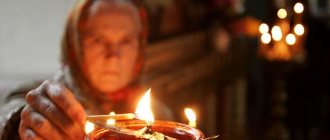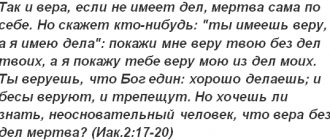Is there a plan?
The problem is that we often think of His providence as some kind of plan in which God has written out our whole life and to which it would be good to comply. Which is what we think we want. However, such conclusions are fundamentally incorrect. Thinking this way, a person forgets that he was created free. Yes, absolutely free! And this was done because it was God's will. As a result of His decision, we have the right to choose whether we want to live with the Lord or not, whether we love Him or close our hearts to Him. The Lord has no power over human freedom, for the sake of it He limits His absolute freedom, which means there can be no “life plan”. By having a plan for us, God would be contradicting himself.
If we call ourselves Christians, we have made the appropriate choice in favor of life with Christ. What's next?
And then everything depends on why we want to know God’s will.
If our desire concerns any “general” issues, such as how we should behave in various situations, and we are interested in what Christ taught his contemporaries, we need to read the Bible, because everything is already given in the Book of Books. In the Old Testament commandments, carved on tablets and given to Moses. In the description of the Sermon on the Mount, where new commandments are given that do not negate the need to fulfill the previous ones: “Do not think that I came to destroy the law or the prophets: I did not come to destroy, but to fulfill” (Matthew 5:17). In the parables of the Son of God, which teach many things, for example: “Judge not, and you will not be judged; do not condemn, and you will not be condemned; forgive, and you will be forgiven” (Luke 6:37).
In the letters of the Apostle Paul:
“Do not be deceived: neither fornicators, nor idolaters, nor adulterers, nor wicked people, nor homosexuals, nor thieves, nor the covetous, nor drunkards, nor revilers, nor extortioners will inherit the kingdom of God” (1 Cor. 6:9-10)
“Always rejoice. Pray without ceasing. In everything give thanks: for this is the will of God in Christ Jesus for you” (1 Thess. 5:16-18).
Any of these texts of Scripture say what the Lord wants a person to be. This is His will for all of us. By the way, when we study the Bible and participate in the Sacraments, we also fulfill the will of God - after all, the words of Christ “Let them know You, the only true God” (John 17:3) speak of knowledge of God as one of the main tasks of a Christian’s life.
Orthodox Life
“How to find out the will of God?” This is a question that concerns many Christians.
St. John replies that the will of God is revealed to those who, thanks to the cleansing of the soul and body from passions, have acquired the virtue of reasoning: “Reasoning in the general sense consists and is known in order to accurately and truly comprehend the divine will at every time, in every place and in every things". And “it is found only in those who are pure in heart, body and lips,” that is, it is the result of an undefiled conscience and pure feelings. Reasoning helps to adjust the conscience according to God and determine “where the wind is blowing, so as not to spread our sails in the opposite direction.”
Whoever acquires reasoning can contribute to the salvation of many other people, heal them from passions and give them health: “Reasoning is a lamp in the darkness, returning the lost to the right path, enlightening the blind. A prudent husband is a destroyer of illness and a restorer of health.” It is no coincidence that clergy and eldership are always highly valued in the Church.
There are different degrees of prudence: “Reasoning in beginners is true knowledge of one’s spiritual structure; in the average, it is an intelligent feeling that infallibly distinguishes what is truly good from what is natural and from what is contrary to good; in the perfect, reasoning is the spiritual mind found in them, bestowed by Divine enlightenment, which with its lamp can enlighten what is dark in the souls of others.” “He who is completely cleansed of passions even sees the soul of his neighbor, although not its very essence, but in what state it is and what its dispositions and feelings are; but he who prospers still judges the soul by his bodily actions.”
To understand how a reasonable person acts, St. John gives the following analogy: “Just as those who have a healthy sense of smell can perceive aromas, although someone secretly has them with them, so a pure soul recognizes in others the fragrance that it itself has received from God, and the evil stench, from which I am completely freed, although others do not feel it.” “Just as one who wears aromas is detected by a fragrant odor even against his will, so one who has the Spirit of the Lord in him is recognized by his words and by humility.”
In order to acquire reasoning, you must first learn to subordinate your will to the will of other people, even those who do not have special spiritual experience, because the Lord Himself can act through them: “All who want to know the will of the Lord must first mortify their own will within themselves and, having prayed to God, with with faith and uncunning simplicity, ask the fathers and brothers in humility of heart and without any doubt in thought, and accept their advice as from the mouth of God, even if it were contrary to their own reason and even if those asked were not very spiritual. For God is not unrighteous and will not allow those souls to be deceived who, with faith and kindness, have humbly submitted themselves to the advice and judgment of their neighbor; therefore, even if those asked do not have spiritual understanding, there is an Immaterial and Invisible One who speaks through them. Those who are undoubtedly guided by this rule are filled with much humility, for if someone “revealed his fortune-telling in the psalter” (see Ps. 48:5) (i.e., the mysterious meaning of parables), then how much do you think is the enlightenment of the verbal mind and the rational souls are superior to the broadcasting of soulless sounds.”
However, there are other ways of acquiring the virtue of reasoning, which are much more difficult than when one’s own will is mortified and entrusted to the will of others. The first way is through fervent, prolonged prayer. It helps to determine what is beneficial for a person and what is detrimental: “Some of those who tested the will of God removed their thoughts from any attachment to this or that advice of their soul, that is, both to that which urges them to do something, and to that which suggests the opposite; and their mind, naked of its own will, with fervent prayer during the appointed days was presented to the Lord - and they achieved knowledge of His will either by the fact that the disembodied Mind mysteriously uttered something to their mind, or by the fact that one of these thoughts completely disappeared in the soul.”
The second way to determine whether our desire is in accordance with the will of God is by the obstacles that arise: “Others, due to the sorrow and difficulties that followed their undertaking, concluded that their work was in accordance with the Divine will, according to the word of the Apostle: “I will come to you by desire... both once and twice, but Satan forbid us” (1 Thess. 2:18).”
The third method is, on the contrary, ease in carrying out what was planned: “Others, on the contrary, by the unexpected success that they received in their work, recognized that it was favorable to God, remembering this word, that God prospers everyone who wants to do good” (see. 2 Chron. 26:5).
The will of God can be revealed directly by enlightenment from God, but only to those people who, thanks to many works, have become close to Him. And usually, on the path to the realization of such a revelation, complex short or long obstacles arise: “Whoever, through enlightenment from above, has acquired God in himself, is confident in the will of God both in matters that require speed and in unhurried matters, in the second way, only without a specific period of time.” . Apparently, we are talking about those people whom the Lord, like gold, tests in the crucible of temptation, in order to later elevate them to high service in the Church. For example, as the biography of St. Philaret (Amphiteatrov) of Kyiv testifies, before he was elevated to the metropolitan see, he had to endure many temptations, vain persecutions and reproaches in other places. And the Monk John Climacus himself did not immediately become the one whose opinion was unconditionally listened to. He was elected abbot of the Sinai Monastery only at the age of 75.
Those people who doubt their choice for a long time can thereby testify to themselves that they are removed from God and suffer from vanity: “Doubting judgments and not deciding for a long time to choose one of the two is a sign of an unenlightened and vain soul.”
Meanwhile, not only the special chosen ones of God can have prudence, but also passionate people, but those who have humbled themselves thanks to the negative experience they have received from sin: “Let the passionate who have humbled themselves rejoice, for if they have fallen into all the pits, and have been bogged down in all the snares, and have been afflicted with every disease , but after recovery they become luminaries and doctors, guides and mentors for everyone, announcing the properties and types of each ailment and with their experience saving those close to the fall.” Even passionate, but sincerely loving people can also be granted the gift of prudence: “The eye of the soul is perceptive and beautiful, so that after incorporeal creatures it (in insight) surpasses every kind of creature. Therefore, often those who are overcome by passions can recognize the thoughts in the souls of others out of great love for them, especially when they do not wallow in carnal defilements.”
Such people can teach others with great success and, being ashamed of their words, restrain themselves from falling into new sins. But the monk does not recommend elevating them to positions of authority: “If some, tormented by previously acquired habits, can even teach others with a simple word, let them teach, but let them not rule; maybe someday, although ashamed of their own words, they will begin active virtue. Thus, what I saw happen to some who were mired in the mire will come true for them: having experienced its uncleanness, they told those passing by how they got into the mire, and did this to protect them, so that they too would not get mired as they walked. the same way; and for the salvation of others, the Almighty delivered them from the mire of sin. If those suffering from passions arbitrarily indulge in sweets, then let them show their teaching by silence. For Scripture says: “Jesus began to do and teach” (Acts 1:1).”
At the same time, “we should not be surprised at anything extraordinary when we see that some do evil deeds and speak good words; for pride, having lifted up the serpent that was hovering in paradise, destroyed it.”
At the same time, the monk warns us not to be too strict towards people who are virtuous only in words: “Do not be a strict judge of those who teach about great virtues with words, when you see that they themselves are lazy in doing good; for the lack of action is often made up for by the benefit of this teaching. We have not all acquired everything equally: some have superiority more in word than in deed; and in others, on the contrary, deeds are stronger than words.”
Anyone who is trying to correct someone must understand that there cannot be a template approach in this matter, for “what is sometimes medicine for one is poison for another; and sometimes the same thing is medicine for the same person when taught at the right time, but at the wrong time it becomes poison.”
The monk gives specific examples of unsuccessful and successful healing: “I saw an inexperienced doctor who dishonored a sorrowful patient and, moreover, did nothing for him, as soon as he plunged him into despair. I also saw a skilled doctor who cut into an arrogant heart with humiliation and extracted all the stinking pus from it. I saw that the same sick person sometimes drank the medicine of obedience to cleanse his uncleanness and then was in motion, walking and not sleeping; and at other times, having fallen ill with the spiritual eye, he remained motionless, in silence and silence. “Have ears to hear, that he may hear” (Matthew 25:30).”
Thus, “with much consideration we must consider when, in what cases and for how long we should stand against the objects of passion and fight with them and when to retreat. For sometimes, due to weakness, one can choose to flee, so as not to die mentally.”
At the previous stages of the “Ladder” there was already talk about ways to combat passions, and at this stage the monk focuses his attention on temptation from demons, which usually attack ascetics who have reached certain heights in spiritual life. According to the author, “all demonic warfare against us comes from these three reasons: from voluptuousness, from pride or from the envy of demons. Blessed are the last, the most damned are the middle ones, and the first are completely obscene.”
In godly deeds, you need to understand that demons “dig three holes for us. Firstly, they fight to hinder our good deed. Secondly, when they are defeated in this first attempt, they try to ensure that what is done is not according to the will of God. And if these thieves do not succeed in this plan, then, having quietly approached our soul, they please us as living in everything pleasing to God. The first temptation is resisted by care and concern for death; to the second – obedience and humiliation; and for the third - constant self-reproach.”
If, despite the measures taken, the demons manage to overcome the soul and darken the light of the mind, “then there will no longer be sober attention, no reasoning, no consciousness, no shame in us, the damned, but their place will be taken by carelessness, insensibility, lack of reasoning and blindness of mind."
There are different degrees of possession by demonic forces: stealing the soul, murder and death. The monk writes that “theft of the soul occurs when we regard as good what is not good; stealing is an inconspicuous deprivation of spiritual wealth; stealing is the unknown captivity of the soul. The killing of the soul is the killing of the verbal mind by falling into obscene deeds; and the destruction of the soul is a fall into despair after committing lawlessness.”
The demons of love of money, vanity and lust can be especially insidious. The demon of the love of money “often takes on the hypocritical image of humility, the demon of vanity encourages the giving of alms, and the demon of voluptuousness does the same. If we are pure from the last two passions, then we will not stop doing works of mercy in every place.”
In the secular world, among people of little faith, there is an opinion that there is so-called black magic and that white magic seems to oppose it, but, according to the thought of St. John, this is a bird of a feather: “Some said that some demons resist others; and I made sure that they were all seeking our destruction.”
The tactics of demons attacking those who strive can be many different: “There is a demon who, as soon as we lie down on our bed, comes to us and shoots at us with evil and unclean thoughts, so that we, being too lazy to arm ourselves against them with prayer and falling asleep with bad thoughts, are embraced then bad dreams.”
Also, among demons, the Monk John distinguishes a certain hierarchy: “There is a demon among evil spirits, called the forerunner, who immediately upon awakening appears to tempt us and defiles our first thoughts. Dedicate the firstfruits of your day to the Lord, for to whomever you give it first, it will be his. One most skillful worker told me this noteworthy word: “At the beginning of the morning,” he says, “I know the whole course of my day.” “Among the unclean spirits there are those who are more crafty than others: they are not content to lead some of us into sin, but advise us to have others as accomplices of evil in order to bring the most severe torments upon us. I saw one person who passed on his sinful habit to another, and then, having come to his senses, began to repent and abandoned sin; but since the one taught by him did not stop sinning, there really was no repentance.”
Those whom demons cannot push to sin, they begin to tempt more subtly: “In the temptations that happen to us, demons fight us so that we say or do something reckless; if they cannot overcome us, then, quietly approaching, they secretly offer us proud thanksgiving to God.”
But it’s not only demons that tempt us. Often the flesh becomes their ally: “The wickedness of unclean spirits is manifold, truly manifold and incomprehensible, and visible to few; I think that even these few do not fully see it. For example, why does it happen that sometimes, while enjoying and being satiated, we watch soberly, but while in fasting and suffering, we are greatly burdened by sleep? Why is it that in silence we feel dryness of heart, but when we are with others we are filled with tenderness? Why, when we are hungry, do we endure temptations in our sleep, but when we are full, we are free from these temptations? Why, in poverty and abstinence, are we gloomy and without tenderness; when, on the contrary, we drink wine, then are we joyful and easily moved to emotion? Let him who is able in the Lord teach this to the unenlightened, for we do not know this. However, we can say that these changes do not always occur from demons, but sometimes from this, given to me and I don’t know how it was associated with me, voluptuous, nasty and lusty flesh.”
Demons can maneuver, either attacking the ascetic, or leaving him alone for a while, or for unknown reasons they can completely move away: “I think no one doubts that demons and passions leave the soul, sometimes for a while, and sometimes forever; but not many people know for what reasons they leave us.” “Sometimes demons retreat of their own accord in order to lead us into carelessness, and then suddenly attack the poor soul, plunder it and accustom it to vices to such an extent that after that it slanderes and resists itself. I also know another retreat of these animals: it happens when the soul is completely established in sinful habits. We see an example of this in babies, who, when they are not given their mother’s breasts, out of long-term habit, suck their fingers.”
The monk assumes that demons can retreat in order to deprive those who struggle of victorious crowns: “Among the wicked and envious spirits, some are of this kind that retreat from the saints deliberately, so as not to deliver crowns to those who fight for victories in battles.” But “an unlazy soul raises up demons to wage war against itself, and as the wars multiply, the crowns also multiply. He who is not wounded by his adversaries will not receive any crown, and whoever does not lose heart from the occasional falls will be praised by the Angels as a brave warrior.” True, there are people who are naturally dispassionate: “I also know the fifth dispassion, which occurs in the soul from much simplicity and commendable gentleness. In justice, help is sent to such from God, “who saves the upright in heart” (Ps. 7:11) and unnoticed by them, delivering them from passions; just like babies, when their clothes are taken off, they hardly notice their nakedness.”
In order to confuse a person and force them to believe them, demons can put good thoughts into the soul or force them to take up an unbearable cross: “Do not be surprised that demons secretly often implant good thoughts in us, and then contradict them with other thoughts. These enemies of ours only intend to convince us with this cunning that they also know the thoughts of our hearts.” “Demons often forbid us to do the easiest and most useful things, while at the same time they encourage us to do the most difficult things.” “There are courageous souls who, out of strong love for God and humility of heart, attempt to do things that exceed their strength; but there are also proud hearts that dare to undertake the same undertakings. And our enemies often deliberately encourage us to do things that are beyond our strength, so that if we do not achieve success in them, we would fall into despondency and abandon even those things that are commensurate with our strength, and thus become the laughing stock of our enemies. . I saw those who were weak in soul and body, who, for the sake of their many sins, attempted feats that exceeded their strength, but could not endure them. I told them that God judges repentance not according to the amount of work, but according to the degree of humility.”
The monk distinguishes between demons that can humble a person and lead to despair, and those that, on the contrary, are capable of puffing up a person’s mind: “One of the sensible men, as if wanting to learn from me, asked me one day, saying: “Tell me, which of the spirits humble our mind through sins and which puff up it?” But since I did not know how to answer this question, and assured him of my ignorance with an oath, he who wanted to learn himself taught me and said: “In a few words, I will give you the leaven of reasoning and leave you to take the trouble to try out the rest.” The demon of fornication and the demon of anger, the demon of gluttony, the demon of despondency and the demon of drowsiness do not have the ability to raise the horn of our mind; The demons of love of money, covetousness, verbosity and many others usually add to the evil of sin the evil of exaltation, and the demon of condemnation is similar to them in this.”
Those who are capable of external sciences, but prone to vanity, are forced by demons to interpret the Holy Scriptures or engage in the study of subtle theological issues in order to then plunge them into heresies and schisms: “Among the unclean spirits there are those who, at the beginning of our spiritual life, interpret the Divine Scriptures to us. They usually do this in the hearts of those who are vain, and even more so in those who are trained in external sciences, in order to deceive them little by little and finally plunge them into heresies and blasphemies. We can recognize this demonic theology, or, better said, fighting against God, by the confusion, by the discordant and unclean joy that happens in the soul during these interpretations.”
However, the monk considers pride to be the most dangerous passion, which is fueled by demons, for it can replace all others: “From some, not only the faithful, but also the unfaithful, all passions have departed, except one. This alone they leave as the primary evil, which fills the place of all other passions; for it is so harmful that it can overthrow from heaven itself.” The obsession with this passion is especially noticeable in people who have fallen away from the Church or are in sects. They love to brag about their purity, chastity, abstinence in food and drink, but they do not notice their greatest passion - pride.
Those who are physically sick also do not need to relax spiritually, because at such a moment demons especially begin to attack: “We need considerable attention at a time when the body is weak. For the demons, seeing us lying on the ground and no longer able from exhaustion to arm ourselves with bodily feats, attempt to attack us with particular cruelty.” Sometimes, due to unbearable pain, a seriously ill person can be driven to despair and the terrible sin of suicide.
During illness, the prodigal demon can be especially insidious: “I noticed that sometimes the prodigal wolf intensifies the illnesses of those who are ill and in the very illnesses produces movements and discharges. It was terrible to see that the flesh, amidst severe suffering, was raging and raging.”
Nevertheless, among the sick there are also those who, thanks to their weakness, are healed by the consolation of grace from passions: “And I turned and saw those lying on the bed, who in their very suffering were consoled by the action of divine grace or a feeling of tenderness, and with this consolation reflected the painful sensations, and they were in such a state of mind that they never wanted to get rid of the illness. And he turned again and saw those who were seriously suffering, who, through bodily illness, as if by some kind of penance, had gotten rid of spiritual passion; and I glorified God, who healed the clay with the clay.” Obviously, St. John Climacus has in mind those sick people who, despite suffering, do not lose touch with God, for they understand that “illness is sometimes sent to cleanse sins, and sometimes to humble the ascension.” Also, illness can be a means of getting rid of laziness and evil passions: “Our good and all-good Master and Lord, seeing that someone is very lazy in deeds, humbles his flesh with illness as the most gratifying asceticism, and sometimes cleanses the soul from evil passions and thoughts." “Those who are weak in soul must recognize the visitation of the Lord and His mercy towards them from bodily illnesses, troubles and external temptations. Those who are perfect will know the visitation of God from the coming of the Spirit and from the multiplication of gifts.”
However, the monk calls on under no circumstances to condemn those who struggle who have fallen into serious illnesses, but, on the contrary, to support them in every possible way: “When we see one of our soldiers in Christ in bodily suffering and illness, we will not slyly explain to ourselves the reason his illness, but it’s better to accept him with simple and not thinking evil love and try to heal him, like our own member and like a warrior wounded in battle.”
Demons attack laymen and monks in different ways: “Those living in the world during illness are attacked by the demon of anger, and sometimes by the spirit of blasphemy. Those living outside the world are tormented by the demons of gluttony and fornication if they have an abundance of everything they need; if they stay in places far from all consolation and asceticism, then they are tempted by the demons of despondency and ingratitude.”
The monk advises using more offensive tactics in the fight against demons, because they bring more success: “We will try not only to repel demons, but also to attack them. For whoever only reflects them sometimes defeats the enemy, and sometimes he himself is defeated; but those who fight offensively always drive out their enemy.”
Demons are very closely intertwined with passions, and therefore “he who conquers the passions hurts the demons: by pretending that he is still subject to the same passions, he deceives his enemies and does not suffer attacks from them. A certain brother, having once been dishonored, without moving his heart at all, prayed in his mind, and then began to cry that he had been dishonored, and concealed his dispassion with feigned passion. The other brother, who did not want to preside at all, pretended to really want to do so. How can I depict to you the purity of that man who went into a fornication, as if for sin, and led the harlot who was there to a pure and ascetic life? Also, a bunch of grapes was brought to one of the silent ones very early in the morning; He, after the departure of the one who brought it, immediately rushed to the grapes and ate them, but without any pleasure, only to show himself to the demons as a glutton. Another, having lost a few branches, pretended to be grieving all day. But such workers need great caution so that, having attempted to laugh at the demons, they themselves are not ridiculed by them. These people are truly those of whom the apostle said: “Like deceivers and truthful” (2 Cor. 6:8).”
So that, through deception from demons, a Christian, having reached the heights of spiritual life after a long time of exploits, does not dream too much about himself and fall into a dangerous state of delusion, the monk at this stage calls: “Let us constantly examine ourselves in relation to all passions and virtues, so that find out where we are: whether at the beginning, in the middle or at the end.” For “there is a time for every thing under heaven,” says Ecclesiastes (Eccl. 3:1). …For those who strive, there is a time of dispassion and there is a time of being overcome by passions, due to the infancy of those who struggle. There is a time of tears and a time of hardening of the heart; there is a time of obedience and a time of command; There is a time of fasting and a time of eating. There is a time of battle from the enemy - the body, and a time of extinguishing the kindling; a time of spiritual storm and a time of mental silence; a time of heartfelt sadness and a time of spiritual joy; time to teach and time to learn; a time of defilement, perhaps for exaltation, and a time of purification for humility; a time of struggle and a time of firm peace; the time of silence and the time of silent activity; a time of unceasing prayer and a time of unfeigned service. So, let not proud zeal deceive us, urging us to seek ahead of time what will come in due time; Let us not look in winter for what belongs to summer, nor during sowing for what belongs to the harvest. For there is a time to sow labors, and there is a time to reap the ineffable gifts of grace. Otherwise, in due time we will not receive what is appropriate and characteristic of that time.”
Although it happens that, under the influence of demons, a Christian can forget even the initial ABC of good deeds, and yet “everyone considers it a shame to see an old man going to a children’s school.”
The monk includes “obedience, fasting, sackcloth, ashes, tears, confession, silence, humility, vigil, courage, cold, labor, suffering, humiliation, contrition, unforgettable malice, brotherly love, meekness, simple and incurious faith, care for the world” to the alphabet of good deeds. , immaculate hatred of parents, impartiality, simplicity with gentleness, arbitrary thinness.”
The signs of those who are successful are “lack of vanity, lack of anger, trustworthiness, silence, reasoning, a strong memory of judgment, mercy, love of strangers, decent admonition, impassive prayer, lack of love of money.”
And the pinnacle of perfection is “an uncaptivated heart, perfect love, a source of humility, admiration of the mind, Christ’s indwelling, not stealing light and prayer, the abundance of God’s radiance, the desire for death, hatred (of mortal) life, alienation from the body, a prayer book for peace, as if forcibly bending God to mercy, co-servant of the Angels, the abyss of reason, the house of mysteries, the repository of ineffable revelations, the savior of men, the god of demons, the master of passions, the master of the body, the master of nature, alien to sin, the house of dispassion, the imitator of the Master with the help of the Master.”
As we see, the Monk John Climacus, like other ancient ascetics, distinguishes a three-part system of spiritual progress: work, contemplation (dispassion) and vision of God, which was described in the 4th century by Deacon Evagrius of Pontus.
However, according to St. John, it is impossible to identify any system or order in the action of demons and passions on a person, although he made such an attempt: “... in insane passions there is no order or reason, but all disorder and disorder. The blessed fathers confirmed this with very convincing evidence, presenting many reliable examples, some of which we put in this word in order to receive instruction from them for correct judgment and other things. Untimely laughter, for example, is sometimes born from the demon of fornication, and sometimes from vanity, when a person shamelessly praises himself internally; sometimes laughter is born from pleasure (of food). Much sleep sometimes occurs from saturation; sometimes from fasting, when those who fast are lifted up; sometimes out of despondency, and sometimes just out of nature. Verbosity sometimes comes from overeating, and sometimes from vanity. Dejection sometimes comes from pleasure, and sometimes from the fact that there is no fear of God in a person. Hula is, in fact, the daughter of pride; and often it is born from the fact that we have condemned our neighbor for the same thing; or from the untimely envy of demons. Hard-heartedness is sometimes born from satiety, sometimes from insensibility, and sometimes from addiction. Addiction, again, sometimes comes from fornication, sometimes from love of money, sometimes from gluttony, sometimes from vanity and from many other reasons. Deceit comes from arrogance and anger. Hypocrisy comes from self-indulgence and self-indulgence.”
Even when a Christian commits virtues, he is not immune from the influence of demons and passions: “Just as, when drawing water from springs, we sometimes unnoticedly scoop up a toad along with the water, so often, while performing deeds of virtue, we secretly fulfill the passions intertwined with them. For example, gluttony is intertwined with love of love, with love - fornication, with reasoning - deceit, with wisdom - cunning, with meekness - subtle guile, slowness and laziness, bickering, self-rule and disobedience; the arrogance of teaching is intertwined with silence; with joy - exaltation, with hope - weakening, with love - again condemnation of your neighbor, with silence - despondency and laziness, with purity - a feeling of grief, with humility - insolence. Vanity adheres to all these virtues as a kind of general collurium (ointment), or, more accurately, poison.”
If we ask God to free us from passion, but do not immediately receive what we ask for, then we should not fall into despair because of this: “Let us not grieve when our petitions to the Lord are not heard until the right time, for the Lord would have us all people instantly became impassive. Everyone who asks something from God and does not receive, without a doubt, does not receive for any of these reasons: either because they ask ahead of time, or because they ask not according to their dignity and out of vanity, or because, having received asked, they would become proud or fall into negligence.”
The monk emphasizes that only those who have courage can go into battle with demons and passions: “Let the fearful not go into battle, Moses commands, and especially God, so that this final deception of the soul is not worse than the first fall of the body, and rightly so.”
At the same time, no one is safe from the fact that during the battle he will not fall or receive wounds. The monk calls on such Christians not to despair, but, on the contrary, to further strengthen their feat in order to receive great rewards from the Lord: “The king not only does not order a warrior who received severe wounds on his face during a battle to be excommunicated from the army, but, on the contrary, to be rewarded excites him to even greater jealousy; so the Heavenly King crowns a monk who suffers many troubles from demons.”
At the same time, one should not hope for quick success: “Many soon received forgiveness of sins, but no one quickly acquired dispassion, for to acquire it requires a long time, great zeal, much labor of love and the help of God.” “Just as it is impossible for someone possessed by a long-term illness to gain health in an instant, so it is impossible to overcome passions or even one of them in a short time.”
In order to avoid making many mistakes during battle, the monk advises having a good spiritual mentor: “Just as a ship that has a good helmsman, with the help of God, comfortably enters the pier, so the soul, having a good shepherd, comfortably ascends to heaven, although there are many sins at one time.” did. Just as someone who does not have a guide conveniently goes astray on his path, even if he is very smart, so someone who goes arbitrarily along the path of monasticism easily perishes, even if he knew all the wisdom of this world.” “Just as eggs, warmed under the wings, are revived, so thoughts, not declared to the spiritual father, turn into deeds.”
However, it may also be that neither education nor environment affects a person: “Sometimes education is the cause of extreme evils, and sometimes a bad community, but often the soul’s own corruption is enough for its destruction. He who got rid of the first two evils got rid, perhaps, of the third; and in whom the third dominates, he is indecent in every place. For there is no place so safe as heaven; however, the devil could not resist even there.”
The monk considers humility to be the most effective cure for all temptations and troubles: “...Mortification of all the above-mentioned passions is humility, and whoever has acquired this virtue has conquered everything.”
So, those who think that prudence and other virtues come by themselves, without certain labors, should not delude themselves: “Every spiritual activity, visible or mental, is preceded by intention and the most zealous desire with God’s assistance in them, for if the first are not there, then and the second will not follow.”
Archimandrite Markell (Pavuk), confessor of the Kyiv theological schools
Do I want this?
However, most often we are interested in where and how exactly God's plan is manifested in the situations that we encounter every day. A girl meets a young man, they communicate and are friends. Naturally, she wants to know if it is His will for them to be together, to get married? Or does yesterday’s schoolboy submit documents to the university he dreamed of and prayed for admission to: will it work out or not? Or, for example, a young man is studying at a seminary and sincerely desires to take the priesthood. Will it be God’s will for this, will He send him a good wife or grant him the privilege of becoming a monk so that he can be ordained, or maybe the further activities of this young man will never be directly connected with the Church?
When we ask ourselves such questions, before asking His will in prayer, we need to honestly ask ourselves: do I really want to know God’s answer? Do I trust Him so much that even if circumstances turn out against my wishes, I will not be afraid or complain? Or, repeating the words “Thy will be done,” I really really want my will to be done, but so that at this moment it coincides with the will of God, as Metropolitan Anthony of Sourozh spoke a lot about?
How often, wanting to hear His answer, we are afraid that it will not be what we want. It is very scary to rely on Heavenly Father and trust Him, because it seems like a step into the unknown. However, being in such a state, a person will not be able to hear what the Lord says. God is very tactful; He never imposes His will, especially if knowledge of it will bring suffering. Moreover, the Lord is love, but there is no love in mistrust and fear.
Therefore, when we want to find out God’s plan for us in a certain situation, we first need to open our hearts to God: talk to Him, pray that He Himself will teach us to trust Him, and thus stop fearing Him. After all, the phrase “Do not be afraid” is like another commandment, otherwise it would not have appeared in the Savior’s speeches more often than others. And then you need to act in accordance with your desires, be it starting a family, going to college, getting a job, etc. At the same time, you need to listen to your heart and mind, not forgetting to pray so as not to fall away from the Lord in your search. As they say, God has no hands but ours; but He also has no lips to pray and ask except ours. After all, if you do not ask to reveal His will, the Lord will not do this, otherwise He will violate our freedom. And the freedom given to man is a manifestation of God’s will for him.
AUTHOR: Tatyana Rubtsova @heart_treasures
Athonite Elder Gabriel: how to find out the will of God and what the lot is
First of all, the Lord answers us with the very circumstances of life. And he answers in three ways: yes, no, or wait. “Yes” means you can do whatever you say. “No” means that it is not useful for you. And “wait” means that it’s not time yet.
We must trust God, if only because He created us.
Have you served in the army? Do you remember how at the evening roll call they call your name, and you answer “Yes!”? And then they tell you to go there and do this. But in order to be sent to do something, you must say: “I am present!” I'm here!". So, the Lord allows many things in our lives that we cannot understand. And maybe we never can. Our daily everyday life is the greatest mystery and discovering the will of God is a great art.
And there are times when I don’t know the will of God. Then I do this: I fast strictly for a while and pray earnestly for several days, and then I go to my confessor and ask his decision. And if you can’t ask your confessor, this is not always possible, then you can do this. Before going to the liturgy, you put lots in your pocket: “yes” and “no.” You pray during the liturgy, and then you draw lots at the end of it.
You know, drawing lots is a serious thing. This has been used since ancient times, even Homer used it. In ancient Greece, before going into any battle, warriors always cast lots. Remember in the Old Testament that even idolaters used lots to find out the will of the gods. And God revealed his will even to them.
Remember the story of the prophet Jonah, when he wanted to flee from the face of God to Tarshish. He boarded the ship and on the way a terrible storm broke out, so everyone realized that the ship would soon sink. And then they cast lots. Out of a large number of people, the lot fell on Jonah; God pointed to him as the cause of the storm.
What about the Old Testament! Even the apostles used lots. But the holy apostles had the Holy Spirit within them and could know the will of God without any casting of lots. But God showed them that He wanted to show them His will precisely through the lot. Remember how they chose a successor to the deceased Apostle Judas? Through lot.
So if you can’t ask your confessor, then you can draw lots. It is best to do this after taking part in the liturgy. So you pray: “God, show your will!” and you draw lots.
I want to say that knowing the will of God is very difficult. This is a great mystery even for saints. And I will remind you of one amazing story from the Old Testament.
When the prophet David became king over the ten tribes of Israel, he decided to number the people of God and conduct a census to find out how many thousands of people there were in each tribe. But this desire was counted as a sin to him. After all, he wanted to go to war and for this he decided to find out how many people he had. But in the war it was the Lord who won, not the people.
God rules his people. And what is David - an empty place? Is he God? And in response, the Lord struck Israel with disaster, so that David prayed: “I have sinned!” But he did not know how to correct his sin.
And then the Lord sent him the prophet Gad, who announced to him the will of God: “Choose one of three: either you will have a terrible famine for three years, or you will be weak for three months and the sword of your enemies will overtake you everywhere, or for three days the sword of the Lord will will fall upon Israel and there will be pestilence throughout all Israel.”
And David realized that he now had to choose one thing, because the Lord does not offer two or three times. In response, he could only say: “Oh, how cramped all three troubles are for me! Three years of hunger? Yes, how will we survive? Will my enemies persecute me for three months? Yes, they will kill me. Will there be a terrible epidemic for three days? Yes, we will all die."
And in response David said: “It is better for me to fall into the hands of God than into the hands of man, because God is more merciful.” And David chose. And the Lord brought down a pestilence on Israel and destroyed 70 thousand people.
And in the midst of all this horror, David saw an archangel coming with a drawn sword and destroying the people of Israel. And then David cried out to God: “My God! After all, it was I who did the census, I sinned! And my people, what is their fault? Smite me for my sin, but spare the people!”
And the angel of the Lord whispered to him: “Faster, faster. Build an altar to the Lord and offer a sacrifice to Him. And then the punishment will end.”
David rushed to buy the land where the angel stood, quickly built an altar and offered a sacrifice. And the pestilence ended.
But look at this case. Didn't David know that God wouldn't like the census? After all, he was a prophet, he was warned. No, he simply, as a person, submitted to the worst part of himself. You see how difficult it is to know the will of God and follow it.
Here is another incident from the life of King David. David wanted to build a temple for God. And he had already prepared everything, collected all the necessary materials for construction. He asked the prophet, and he answered him: “Yes, build.” But God did not want to accept the temple from him. Because the Lord wanted his son Solomon to build the temple. After all, David was the king of war. He killed people in the war. And the temple must be built by a person without mortal sins.
Well, let me remind you of another story from the New Testament. Remember how the holy evangelist John and his brother James asked the Lord to sit at His right hand and left side in the Kingdom of Heaven? And remember what the Lord told them? He told them, “You don’t understand what you are asking.”
How to understand this? Did the Apostle John, the first apostle of theology, not understand what he was asking? But John is the patron of theology. Did he really not understand such simple things? Yes, in this case he did not understand, although now it is clear even to us.
I am telling you all this so that you understand: to know the will of God is a great work and it is not easy even for saints.
One brother once came to St. Seraphim of Sarov and asked:
- Elder, who is the most virtuous, the most holy in our monastery?
Venerable Seraphim replied:
- The first is the abbot. He is the most holy. Then - his deputy. And the third will be the cook.
- What!? Cook!? - exclaimed the surprised brother - Yes, Satan brought him to the monastery! He turned the entire monastery upside down. How can such a person be in third place in holiness?
To this the monk replied:
- And if he got into the world, he would commit 30 greatest crimes. But he holds back all the bad things in himself and makes more efforts than anyone else in the monastery combined.
Now, you see how differently God judges people. Will the Lord judge a nun and a depraved harlot in the same way for the same sin? It is very difficult to know God's judgment. And in order for us to completely establish ourselves in this understanding, let’s go beyond the Holy Mountain.
Many years ago there was a great earthquake in Athens, and everyone who was there dropped everything and stood up to pray to God, raising their hands in prayer. And only one person did not stand with them. When this terrible event was over, the officer who was in charge there at the time approached this man and simply attacked him with accusations.
- Aren `t you ashamed!? Look, isn't it a sin? People could have died before your eyes.
And this man cried and said:
“I lost both legs in the Greek war, and you ask me why I didn’t get up.”
Then the officer also began to cry.
You see how difficult it is to understand the destiny of God and the knowledge of His will. Therefore, you need to be very careful in your court. Only God knows the depths of life. And the first spiritual law is that every person must pray for everyone. Because we do not know the destinies of God, and the worst person can repent and get ahead of us in the Kingdom of Heaven.
I know of one case when a man threw himself into an abyss, but on the fly said: “Lord, have mercy!” and was forgiven. This was revealed to one ascetic.
So we do not know how each soul is judged. So, you do what you can and do not abandon spiritual responsibilities, and I do what I can, and what we cannot, the Lord will provide.
A monk must have a confessor. A monk is sanctified by two things: by opening his thoughts and making a pure confession, and by doing everything with blessing. Otherwise, Satan can very easily catch any Christian.
Based on materials from the Information Portal of Holy Mount Athos
God's Revealed Will
There is much written to us in the Word that is already His will. This is something you should NOT ask. Like, for example, can I steal or kill?
Therefore, before you start praying and asking God anything, you need to study His Word. From my own experience I can say that there are answers to all questions. There is something in the Word that displeases God that will make you His opponents. Edifying one another every day, serving with gifts will help us grow, not fall.
Thesis three
There is no perfect plan because we are not perfect. God acts providentially in our lives, directing our weaknesses and even sins towards our salvation. And this too is the will of God.
Here's a simple truth: we are not perfect. And it would be strange if the omniscient God, knowing about this fact, made some ideal plans for us. God knows much more about our weaknesses and our imperfections than we do ourselves. Calling us to perfection, He always takes into account the current state in which we find ourselves. No matter what dead end we run into as we walk our own paths through life, God will always find a path for us that leads us out of this dead end. And sometimes He can turn such a deadlock situation itself into good not only for us, but also for many other people.
In the life of Saint Luke (Voino-Yasenetsky), an Orthodox bishop and at the same time an outstanding doctor, there was a moment when he deviated from the will of God. Moreover, this happened when the saint was already a fearless confessor of Christ in the face of the most cruel persecutors, and survived two convictions, exile and imprisonment. In 1933, the saint decided to finally retire from his episcopal ministry and devote himself entirely to medicine. He was going to found a clinic for purulent surgery, in which he could expand and systematize his scientific research in this area.
From that moment on, he clearly felt that the grace of God had left him. Things were not going well, nothing was working with the clinic, all his actions did not bear any fruit. However, even after obvious admonitions from God, the saint, by his own admission, could not immediately admit the error of his choice:
“In saving me, the Lord God sent me a completely extraordinary prophetic dream, which I remember with perfect clarity even now, many years later.
I dreamed that I was in a small empty church, in which only the altar was brightly lit. In the church, not far from the altar, against the wall there is a shrine of some saint, covered with a heavy wooden lid. In the altar, a wide board is placed on the throne, and on it lies a naked human corpse. On the sides and behind the throne stand students and doctors smoking cigarettes, and I lecture them on anatomy on a corpse. Suddenly I flinch from a heavy knock and, turning around, I see that the lid has fallen from the saint’s shrine, he sat down in the coffin and, turning, looks at me with silent reproach. I woke up in horror...
It is incomprehensible to me that this terrible dream did not bring me to my senses. Upon discharge from the clinic, I returned to Tashkent and continued working in the purulent-surgical department for another two years, work that was often associated with the need to conduct research on corpses. And more than once the thought occurred to me that such work was unacceptable for a bishop. For more than two years I continued this work and could not tear myself away from it, because it gave me one after another very important scientific discoveries, and the observations collected in the purulent department subsequently formed the most important basis for writing my book “Essays on Purulent Surgery.”
In my prayers of repentance, I earnestly asked God for forgiveness for this two-year continuation of work on surgery, but one day my prayer was stopped by a voice from the unearthly world: “Don’t repent of this!” And I realized that “Essays on Purulent Surgery” were pleasing to God, because they greatly increased the strength and significance of my confession of the name of Christ in the midst of anti-religious propaganda.”
This is how the Lord skillfully wove the thread of His will into the fate of the saint, even where the saint himself so stubbornly refused to fulfill this will. And in the life of each of us, there is also bound to be a thread through which God can lead us out of the most dense forest of our own ideas about how we should live. You just need to be able to discern it in this bizarre interweaving of our current circumstances.
Why everyone should know God's will
The Lord wants to save all people - this is His absolute Will, His desire. But often the absolute will of God meets an obstacle in the form of human personal freedom. Throughout life, a person fluctuates between good and evil, and often chooses the side that opposes the Divine.
Without a person's conscious choice, salvation cannot be accomplished.
In this case, the Lord shows permission, because we all know that it is impossible to make a person happy against his own desire. The will of the Lord is the measure of all our actions. Depending on whether a person’s lifestyle corresponds to God’s Providence for him, one can draw a conclusion about the correctness or harmfulness of human actions.
Important! Some people may think that only the righteous and Saints have the right to hear the voice of God and know His will, but Holy Scripture tells us the opposite: every Christian should try to understand and know the will of the Lord.
Many believers at the beginning of churching ask the question: “Why does evil exist in the world? Why can’t the Lord make all people initially righteous, so that they are not tempted to commit sin or renounce the faith?”
In answering this question, we must remember that man was originally created in the image and likeness of God, and therefore he was given freedom of choice and freedom to make decisions. If a person did not have a choice between good and bad, good itself would not be good, and the concept of freedom would become a fiction.
Without a person’s personal and conscious choice, salvation cannot be accomplished, because its essence lies in the conscious desire for unity with the Lord: in prayerful communication, approaching God, participation in the Sacraments, and the spiritual development of the soul.
Be established in the foundation of the doctrine, in the Word
It is very important to be confident in the foundation, in the teaching, in order to build a right house from your deeds according to the will of God. The teaching of Jesus Christ is quite clear and understandable. It’s another matter when various “additions” and “traditions” are mixed into the Bible. This leads to confusion and man can no longer clearly understand God. And he simply has to turn to the “experts in the teachings” who simply tell him what needs to be done.
How to understand the will of God?
After that, I began to pray and ask God about it. And I received a very clear answer - only His Word is true and only the Word is the seed that produces the fruits of God.
All believers do something, move somewhere, WITHOUT KNOWING the will of God. But there are some passages in Scripture that speak very clearly about our purpose.
In other words, I HAVE NO RIGHT to walk in MY OWN ways because there is only one WAY, Christ. I can’t come up with my own cases and laws. I must know what God's will is. Because I am His creation and created for His works.
So, the first condition for knowing the will of God is to present YOUR BODY as a living sacrifice to carry out His works. Which ones? First become a vessel. People need to first know what to do, and only then do they think whether to agree or not. This is not faith. Faith is confidence in the invisible. One of the meanings of the word “faith” is trust. And it is precisely the provision of oneself as a sacrifice that is the first step of trusting God. And this is suffering in the flesh.
Thy will be done
There is such a phrase in the Lord's Prayer. And it exists in other places too.
It is very important to see that there is no talk of asking here. This statement. I would even say an urge, a call. And we must make this call. This confession is entrusted to us. But before you say “let it be,” you need to know, cognize what God’s will is.










